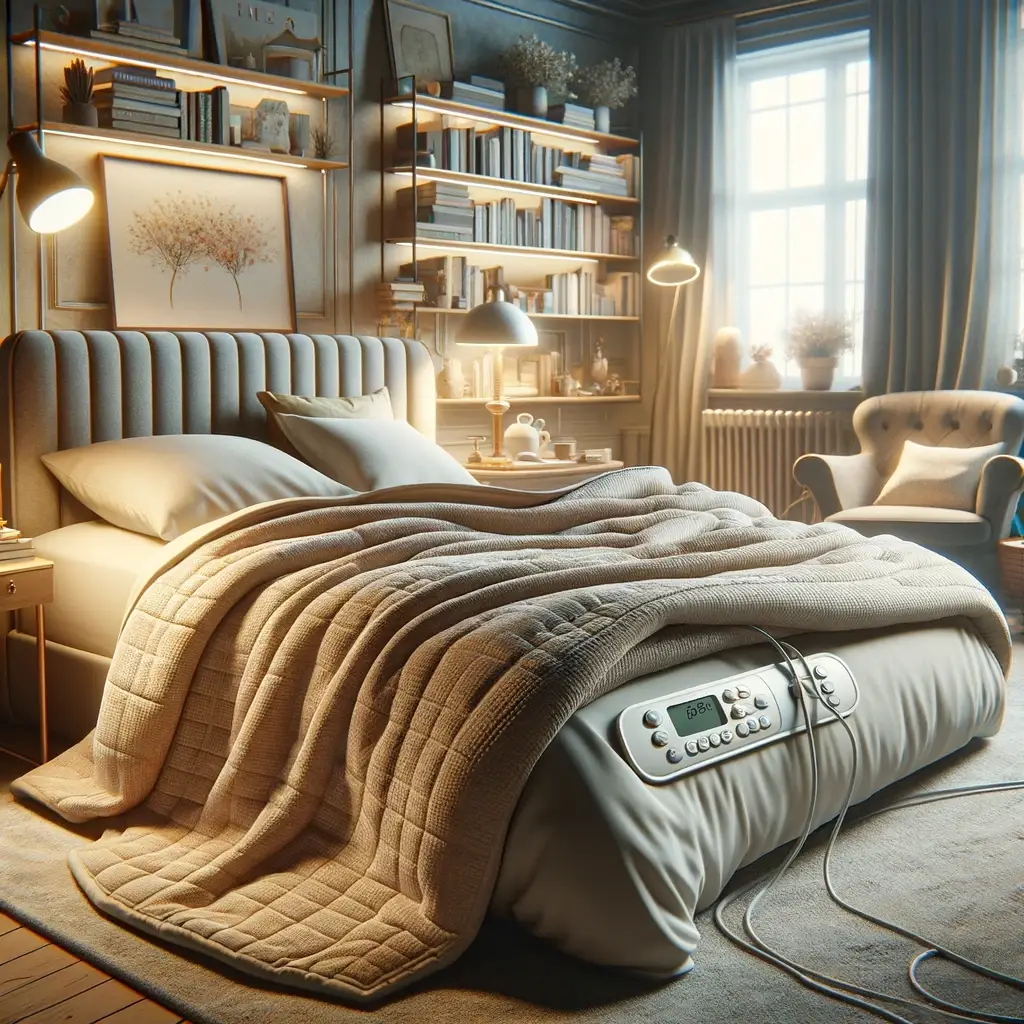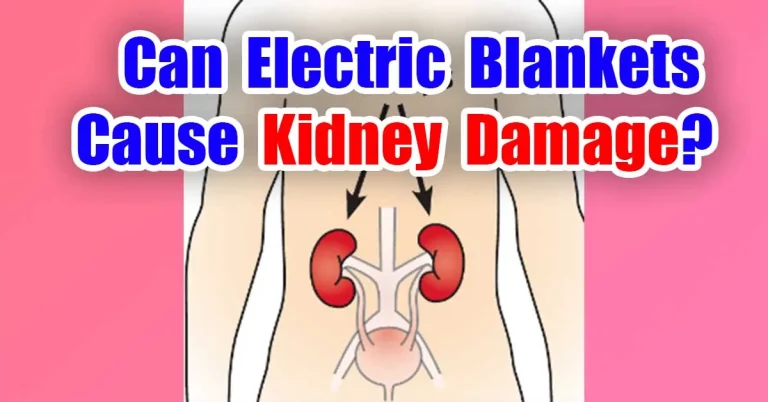In the heart of a cold winter night, the cozy warmth of an electric blanket can seem like a comforting embrace. These popular household items have become a staple for many, offering not just warmth but a sense of comfort and relaxation.
However, amidst their widespread use, a crucial question lingers in the minds of health-conscious consumers: Can electric blankets cause kidney damage?
If you are looking to buy an electric blanket or use one then you may have heard a rumor that electric blankets cause kidney damage.
TL;DR: there is scientific evidence that proves electric or heated blankets could cause kidney damage, but the relationship between electric blankets and kidney damage isn’t straightforward. This is explored below.
If your electric blanket is overheated up to 104 degrees Fahrenheit then your body causes dehydration which leads to low blood pressure and decreased kidney function.
But this case most commonly happens if you have poor blood circulation, diabetes, blood pressure, or body pain problems.
Overheating can also affect existing physical conditions and make their condition worse.
In this article, we will discuss how electric blankets cause kidney damage and other damages in certain situations and how you should avoid them.
There are lots of dangers of using electric blankets without any proper guidance, so we need to also discuss how to safely use electric or heated blankets.
Can Electric Blankets Cause Kidney Damage? Let’s get started.

What’s The Connection Between Electric Blankets And Kidney Damage?
You may think there is no connection between electric blankets and kidney damage. However, our team have studied the effects of kidney damage on electric blankets extensively.
Most electric blankets emit toxic fumes no matter how low voltage electric blankets you use.
The wires of electric or heated blankets are coated in polytetrafluoroethylene known as PTFE.
This emits a variety of carcinogenic fumes when heated and these are most notably tetrafluoroethylene which is scientifically proven to cause kidney damage.
Source: The Hidden Risk of Electric Blankets
Can electric blankets cause kidney damage?
We know the above studies are difficult to understand but remember electric blankets can cause kidney damage, especially in certain types of people with diabetes, poor blood circulation, or any health issues.
So yes electric blankets can cause kidney damage if you don’t use them correctly, however, if used correctly and in moderation, they are unlikely to cause kidney damage in healthy individuals. The key here is moderation and proper usage.
Experts recommend avoiding prolonged exposure to high-heat settings, as excessive heating, regardless of the source, can lead to dehydration.
And this is not the only thing because there are lots of dangers of using electric blankets or heated blankets.
Also Read: Can Electric Blankets Cause Hair Loss?
Do electric blankets dehydrate you?
Yes, electric blankets can dehydrate your body because when you are wrapped with layers of electric blankets then you can’t tell how much you are sweating.
According to the National Kidney Foundation, severe dehydration can lead to kidney damage. Dehydration can cause a build-up of wastes and acids in the body, and it can clog the kidneys with muscle proteins (myoglobin).
Because electric blankets produce heat which leads to sweating and causes dehydration. And when your body becomes dehydrated then it can have an affect on kidneys.
While unlikely in most healthy individuals, if you’re setting the temperature high on electric blankets, please be aware that this can cause dehydration, which may cause kidney damage.
Dangers of Electric Blankets
Outside of kidney damage, there are other dangers in using electric blankets especially if you don’t use them correctly.
Dangers such as leg pain, joint pain, blood clots, hair loss, nerve damage, and heart failure.
These serious conditions can happen when you don’t use electric blankets correctly.
Electric blankets can overheat sometimes when they do then you need to turn OFF the electric or heated blankets otherwise it can cause nerve damage, hair loss, or joint pain.
Because heat can damage the nerves in people with diabetes, blood pressure, poor blood circulation, or any physical syndrome.
So you need to properly use electric blankets.
Some people might think electric or heated blankets are totally safe and when it gets a hole or is damaged, they still use them without repairing them or replacing them.
And when they do then electric blankets can start to overheat and can cause many problems.
Accoring to this study, people have died from overheating in electric blankets.
So electric blankets are really helpful on winter nights but the same time they can be dangerous.
So you need to know how to use electric blankets safely.
Are electric blankets bad for your kidneys?
Short answer is not always. Caution is advised for individuals with pre-existing kidney conditions. For those with chronic kidney disease or other kidney-related health issues, it’s best to consult with a healthcare provider before using an electric blanket. This precaution is to ensure that the added heat does not exacerbate any existing conditions.
While there is no direct evidence to suggest that electric blankets cause kidney damage in healthy individuals, moderation and proper use are crucial. Users should follow the manufacturer’s guidelines and be aware of their body’s response to prolonged heat exposure. For those with existing kidney issues, a consultation with a healthcare professional is advisable before using electric blankets.
How to use electric blankets safely
There are some basic rules that you need to know for using electric or heated blankets safely.
That’s how you can use electric blankets properly if you know the right way to use electric blankets then you don’t have to worry about those dangers.
Alternatives to electric blankets
While electric blankets offer warmth and comfort, concerns about their potential health impacts lead many to seek alternatives. Understanding these alternatives is crucial for making informed decisions, especially for those prioritizing health and safety. Below, we explore several safer heating solutions, outlining their advantages and drawbacks.
1. Microwavable Heat Pads
- Pros: Microwavable heat pads provide localized warmth and are typically made of materials like gel or grains. They are portable, reusable, and don’t emit electromagnetic fields. They’re also beneficial for targeted pain relief.
- Cons: Their heat dissipates relatively quickly, requiring frequent reheating. They don’t offer whole-body warmth and are not ideal for prolonged use throughout the night.
2. Hot Water Bottles
- Pros: A classic and simple solution, hot water bottles are inexpensive and easy to use. They provide localized heat and can be placed under blankets to warm the bed before sleep.
- Cons: There’s a risk of leaking, and they can cool down during the night, requiring replacement. Like heat pads, they don’t offer continuous whole-body warmth.
3. Layered Bedding
- Pros: Using multiple layers of blankets, especially those made from insulating materials like wool or fleece, can provide significant warmth without any electrical components. This method is safe and allows for adjusting warmth by adding or removing layers.
- Cons: It may not provide the immediate warmth that some desire and can be cumbersome for those who prefer not to sleep under heavy layers.
4. Flannel Sheets
- Pros: Flannel sheets are a cozy, non-electric alternative. Their fabric is designed for extra warmth and softness, enhancing comfort during colder nights.
- Cons: They may not provide enough warmth for extremely cold conditions and require regular washing to maintain hygiene.
5. Thermal Underwear
- Pros: Wearing thermal underwear to bed is an efficient way to retain body heat. Modern thermal wear is breathable, comfortable, and available in various materials suitable for different sensitivities.
- Cons: This might not be a preferred option for those who find wearing extra clothing in bed uncomfortable.
6. Space Heaters
- Pros: Space heaters can warm up a room effectively and come with various settings to control temperature and timing.
- Cons: They need to be used with caution due to fire risks and can significantly increase electricity bills. They also don’t provide the direct, personal warmth of a blanket.
7. Bed Warmers (Electric Mattress Pads)
- Pros: Similar to electric blankets but placed under the bedding, these pads provide uniform heat across the bed. They are generally considered safer than electric blankets as they are less prone to crumpling or folding, which can lead to overheating.
- Cons: They still involve electricity and EMF exposure, although at lower levels compared to electric blankets.
Final Words
Can electric blankets cause kidney damage? We understand how important electric blankets can be on winter nights.
Electric blankets prevent us from getting cold and can be very effective to you keep warm.
But If you use electric blankets regularly then it can cause a problem especially with people who have diabetes, poor blood circulation or other physical syndromes.
So you need to understand how to use electric blankets in the right way because if you use your electric blankets or heated blankets carelessly then you can get yourself in trouble.
Because there are lots of dangers in using electric blankets if you don’t use them correctly.
So if you are using electric blankets then you have to be really conscious when using them otherwise you can get troublesome health issues.
If you have any questions regarding kidney damage and electric or heated blankets then you can ask them in the comment section of this article.
